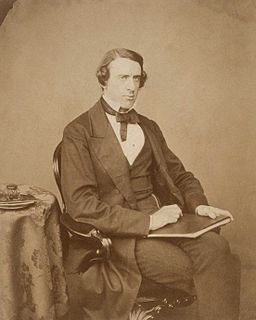A Quote by John Tillotson
For a Man cannot believe a Miracle without relying upon Sense, nor Transubstantiation without renouncing it. So that never were any two things so ill coupled together as the Doctrine of Christianity and that of Transubstantiation, because they draw several ways, and are ready to strangle one another: For the main Evidence of the Christian Doctrine, which is Miracles, is resolved into the certainty of Sense, but this Evidence is clear and point blank against Transubstantiation.
Quote Topics
Related Quotes
It is wrong for a man to say that he is certain of the objective truth of any proposition unless he can produce evidence which logically justifies that certainty. This is what Agnosticism asserts; and, in my opinion, it is all that is essential to Agnosticism. That which Agnostics deny and repudiate, as immoral, is the contrary doctrine, that there are propositions which men ought to believe without logically satisfactory evidence; and that reprobation ought to attach to the profession of disbelief in such inadequately supported propositions.
Depth, in a pictorial, plastic sense, is not created by the arrangement of objects one after another toward a vanishing point, in the sense of the Renaissance perspective, but on the contrary (and in absolute denial of this doctrine) by the creation of forces in the sense of push and pull . Nor is depth created by tonal gradation (another doctrine of the academician which, at its culmination, degraded the use of color to a mere function of expressing dark and light).
One area of the Book of Mormon that does bother some is what they see as anachronistic doctrine; that the Book of Mormon has Christian doctrine prior to the coming of Christ; that it has seemingly New Testament doctrines appearing centuries before Jesus arrives, and it seems to be representing a form of Christianity existing in the New World where there doesn't seem to be much evidence of that archaeologically. Christianity is invisible in the New World prior to the coming of Columbus, and so those things seem like clear anachronisms to people looking at it in that way.
Minds fettered by this doctrine no longer inquire concerning a proposition whether it is attested by sufficient evidence, but whether it accords with Scripture; they do not search for facts as such, but for facts that will bear out their doctrine. It is easy to see that this mental habit blunts not only the perception of truth, but the sense of truthfulness, and that the man whose faith drives him into fallacies treads close upon the precipice of falsehood.
We are told dogmatically that Evolution is an established fact; but we are never told who has established it, and by what means. We are told, often enough, that the doctrine is founded upon evidence, and that indeed this evidence is henceforward above all verification, as well as being immune from any subsequent contradiction by experience; but we are left entirely in the dark on the crucial question wherein, precisely, this evidence consists.
It is my conviction that if any professional biologist will take adequate time to examine carefully the assumptions upon which the macro-evolution doctrine rests, and the observational and laboratory evidence that bears on the problem of origins, he/she will conclude that there are substantial reasons for doubting the truth of this doctrine. Moreover, I believe that a scientifically sound creationist view of origins is not only possible, but it is to be preferred over the evolutionary one.
God is angry with man. Unless we believe and repent we shall all be damned. It is impossible, indeed, for its advocates even to say this without instantly contradicting themselves. Their doctrine frightens them. They explain in various ways that a great many people will be saved without believing, and that eternal damnation is not eternal nor damnation.





































